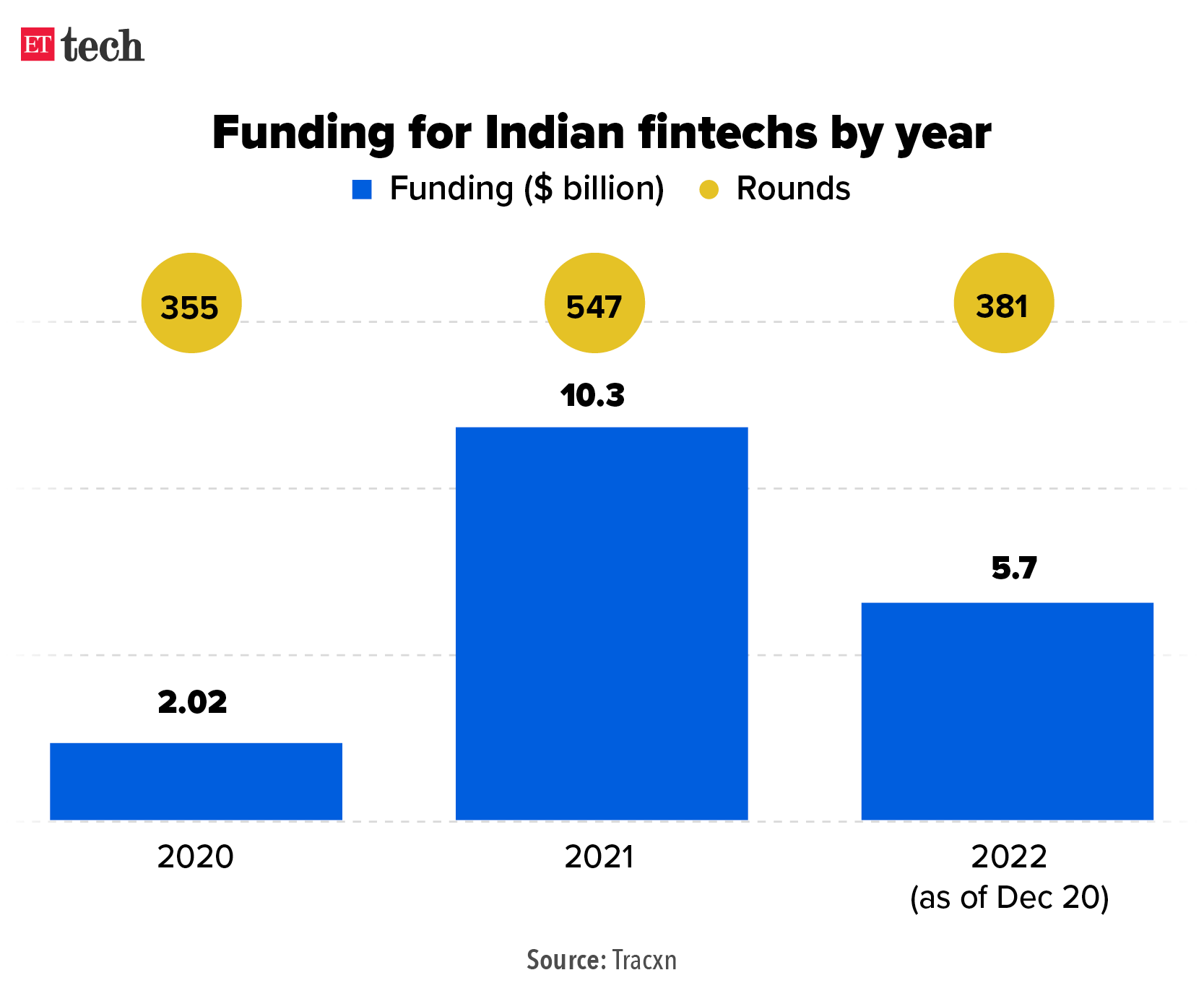Indian fintech faces tough 2023; PayU India lays off 6% of employees
Also in this letter:
■ PayU India sacks 150 employees, about 6% of workforce
■ Taxman seeks info from foreign online gaming firms
■ Threat of ‘hacktivism’ set to rise in 2023, experts say
Indian fintechs gear up for a tumultuous 2023

The operating environment is expected to get tougher for Indian fintech startups next year amid a worsening funding winter and regulatory changes over the past few months, multiple founders and investors told us.
Headwinds: With the regulatory overhang on fintechs continuing, and the Reserve Bank of India (RBI) taking steps to regulate various aspects of the sector, investors are expected to remain selective in their approach, leading to potential consolidation in the coming months, these people said.
Further, with the release of the new digital lending guidelines, banks and non-banking finance companies (NBFCs) have also moved away from first loan default guarantee (FLDG) partnerships, dealing a blow to smaller fintechs by forcing them to lend at higher costs, at least five entrepreneurs and executives told ET.

Adding to the challenge, the Reserve Bank of India (RBI) has been stringent in terms of providing NBFC licence to fintech firms, multiple entrepreneurs said.
Fintech’s funding winter: According to data sourced from research firm Tracxn, funding in the Indian fintech ecosystem almost halved to roughly $5.7 billion in 2022 from $10.3 billion in 2021. However, investments in Indian fintech this year are still significantly higher than in 2020, when the sector garnered just $2.02 billion in equity funding.

Consolidation underway? We reported on November 25 that digital payments major PhonePe was close to buying buy-now-pay-later (BNPL) startup ZestMoney, signalling a potential wave of consolidation in 2023.
“The regulation landscape has made several practices such as FLDG unavailable to fintechs. This coupled with the funding winter ensuing globally means the coming year is likely to see dampening in terms of funding. Investors are expected to become more selective. There will be consolidation in the market, an uptick in collaborative models with regulated entities and exit of firms with a weaker footing,” said Kunal Pande, partner, KPMG in India.
PayU India sacks 150 employees, about 6% of workforce

PayU India, the payments and fintech business of Prosus, has fired 150 people or about 6% of its workforce, as its realigns teams locally, ET has learnt.
Prosus is the investment arm of South African multinational Naspers, among the largest backers of Indian new-age internet companies, including Swiggy, Byju’s and Meesho, among many others.
Details: A person aware of the matter said the layoffs are spread across various teams and mainly impacted PayU India’s unit Wibmo, a digital payment security and mobile payment technology firm it acquired in 2019 for $70 million.
PayU India’s fintech businesses include Wibmo, LazyPay and Citrus Pay.
Statement: “Keeping in mind our highest strategic priorities, we are realigning teams across some businesses in India… Close to 150 employees, which is less than 6% of our total employee strength, will be impacted by the organisational realignment,” a spokesperson for PayU said. The company does not have “any plans for any major downsizing”, the spokesperson added.
Regulatory challenges: Earlier this year, the RBI said that prepaid payment instruments (PPIs) should not be loaded with credit lines. This caused PayU India’s lending arm LazyPay to make changes to its card offering, LazyCard. In July, we reported that LazyPay had to suspend its buy-now-pay-later (BNPL) payment product LazyPlus UPI amid rising regulatory scrutiny of card-based credit fintech firms.
BillDesk deal canned: In October, Prosus terminated its $4.7 billion acquisition of online payments gateway firm BillDesk by PayU Payments, which was first announced in August 2021. It decided to pull out barely a month after the Competition Commission of India (CCI) approved the contours of the deal.
Taxman seeks info from foreign online gaming firms

About half a dozen online gaming firms in Malta, the UK and Gibraltar have been approached by the Indian tax authorities to gather information on the number of users from India and the sums they have spent.
What’s the issue? Typically, importers of services pay GST on a reverse charge basis.
However, in case of import of online information and database access or retrieval services (OIDAR) by unregistered, non-taxable recipients, the supplier located outside India is responsible for tax payment.
Thanks to the low value, high volume nature of the transactions, it’s virtually impossible to track and identify residents remitting funds overseas to bet or play on online platforms.
Penalty: Unlike the Rs 20 lakh threshold for levy of GST on domestic entities, tax is applicable on various cross-border services without any cut-off. A 15% penalty can be imposed if the tax department believes GST was “intentionally avoided.”
TWEET OF THE DAY
Threat of ‘hacktivism’ set to rise in 2023, experts say

The threat of ‘hacktivism’ – cyberattacks on government bodies motivated by political or social reasons – is set to rise in 2023, experts said, citing growing geopolitical and social conflict. They called for strengthening of security measures around critical infrastructure.
On the rise: Hacktivism, although not a new phenomenon, has become more organised and sophisticated after the Ukraine-Russia conflict, according to Check Point.
In the past few months, various government bodies in India have been subject to such cyberattacks. Some of these were triggered by derogatory remarks made about Prophet Muhammad. This led to reactions from a group, DragonForce Malaysia, which targeted more than 70 government institutions in the biggest attack of its kind in India.
Earlier this month, another group, Team Mysterious Bangladesh, claimed it had compromised the website of the Indian Central Board of Higher Education.
Govts under attack: According to Check Point, governments are the second-most targeted sector in the world. In the third quarter of this year, governments were on the receiving end of 1,564 weekly attacks on average, representing a 20% increase year-on-year, with the government sector in India reporting 3,354 attacks weekly per organisation in the past six months.
Shift towards cost-cutting in deal talks with clients: Genpact CEO

Around two-thirds of deal conversations with clients now are related to reducing costs amid macroeconomic uncertainties, which is a complete contrast to the situation in the last three years, said the chief executive at Genpact, one of the world’s top business process management (BPM) companies.
The big flip: Until about seven years ago, up to 70% of the BPM client spending would be skewed towards cost saving with the remaining going into growth, risk and resilience management solutions. Over the last three years, this equation has flipped due to pandemic-fuelled demand, NV Tyagarajan told us.
“If I now look at our demand view today versus 12 months back, one of the biggest changes that has happened is many of our clients and their industries are worried about a slowing world in terms of growth,” he said.
Clients are also worried about inflation even though it might be lower than one month back. “But it is still higher than the past and interest rates are higher. Therefore, costs become much more important today than it was one year back,” the head of the NYSE-listed company said.
Other Top Stories By Our Reporters

Top-notch team at Google looks for right ‘data’ solutions: A top-notch team at tech giant Google is not only dreaming up ways and means to democratise access to information but also to make it more intuitive, using cutting-edge solutions. Read on to find out more.
Meet CTOs at the forefront of change at Wipro and Kotak Mahindra Bank: While one is a rare breed in the tech landscape, the other is trying to future-proof a financial firm through an end-to-end technology transformation.
Global Picks We Are Reading
■ Elon Musk’s finances complicated by declining wealth, Twitter pressures (WSJ)
■ Everyone is using Google Photos wrong (Wired)
■ 2022’s most spectacular, cringeworthy, and sad NFT disasters (Rest of World)
For all the latest Technology News Click Here

